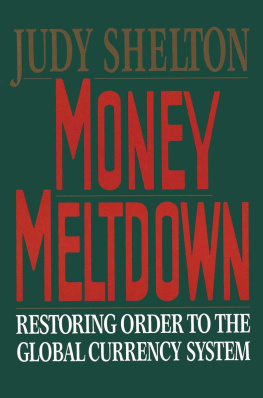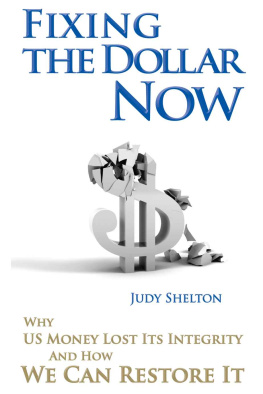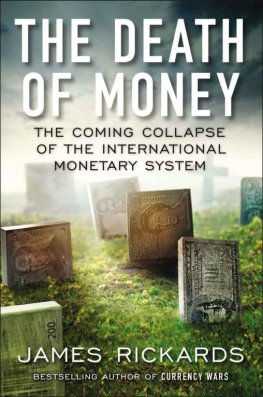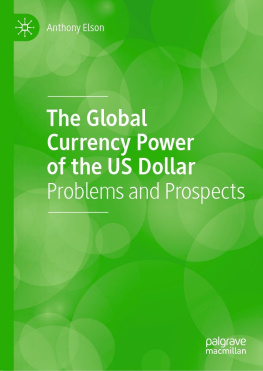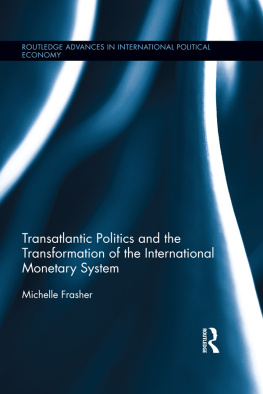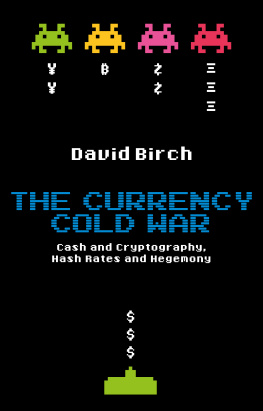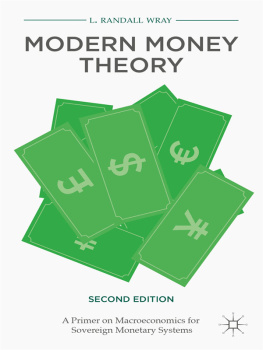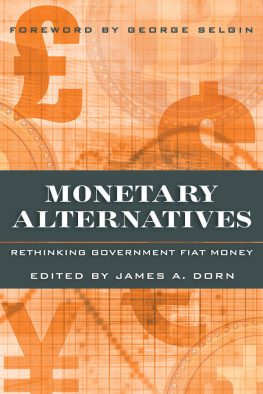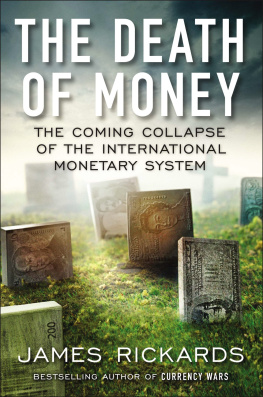Judy Shelton - Money Meltdown: Restoring Order to the Global Currency System
Here you can read online Judy Shelton - Money Meltdown: Restoring Order to the Global Currency System full text of the book (entire story) in english for free. Download pdf and epub, get meaning, cover and reviews about this ebook. year: 1998, publisher: Free Press, genre: Politics. Description of the work, (preface) as well as reviews are available. Best literature library LitArk.com created for fans of good reading and offers a wide selection of genres:
Romance novel
Science fiction
Adventure
Detective
Science
History
Home and family
Prose
Art
Politics
Computer
Non-fiction
Religion
Business
Children
Humor
Choose a favorite category and find really read worthwhile books. Enjoy immersion in the world of imagination, feel the emotions of the characters or learn something new for yourself, make an fascinating discovery.
- Book:Money Meltdown: Restoring Order to the Global Currency System
- Author:
- Publisher:Free Press
- Genre:
- Year:1998
- Rating:5 / 5
- Favourites:Add to favourites
- Your mark:
- 100
- 1
- 2
- 3
- 4
- 5
Money Meltdown: Restoring Order to the Global Currency System: summary, description and annotation
We offer to read an annotation, description, summary or preface (depends on what the author of the book "Money Meltdown: Restoring Order to the Global Currency System" wrote himself). If you haven't found the necessary information about the book — write in the comments, we will try to find it.
Judy Shelton: author's other books
Who wrote Money Meltdown: Restoring Order to the Global Currency System? Find out the surname, the name of the author of the book and a list of all author's works by series.
Money Meltdown: Restoring Order to the Global Currency System — read online for free the complete book (whole text) full work
Below is the text of the book, divided by pages. System saving the place of the last page read, allows you to conveniently read the book "Money Meltdown: Restoring Order to the Global Currency System" online for free, without having to search again every time where you left off. Put a bookmark, and you can go to the page where you finished reading at any time.
Font size:
Interval:
Bookmark:
Restoring Order to the Global Currency System

JUDY SHELTON
 THE FREE PRESS
THE FREE PRESS
A Division of Macmillan, Inc.
NEW YORK
Maxwell Macmillan Canada
TORONTO
Maxwell Macmillan International
NEW YORK OXFORD SINGAPORE SYDNEY
Copyright 1994 by Judy Shelton
All rights reserved. No part of this book may be reproduced or transmitted in any form or by any means, electronic or mechanical, including photocopying, recording, or by any information storage and retrieval system, without permission in writing from the Publisher.
The Free Press
A Division of Macmillan, Inc.
866 Third Avenue, New York, N.Y. 10022
www.SimonandSchuster.com
Maxwell Macmillan Canada, Inc.
1200 Eglinton Avenue East
Suite 200
Don Mills, Ontario M3C 3N1
Macmillan, Inc. is part of the Maxwell Communication Group of Companies
Printed in the United States of America
printing number
1 2 3 4 5 6 7 8 9 10
Library of Congress Cataloging-in-Publication Data
Shelton, Judy.
Money meltdown: restoring order to the global currency system/Judy Shelton.
p.; cm.
Includes index.
ISBN 0-68-486394-4
eISBN-13: 978-1-439-18846-0
ISBN-13: 978-0-684-86394-8
1. International finance. I. Title.
HG3881.S513 1994
332.042dc20 93-48786
CIP
Grateful acknowledgment is given to the publishers for permission to reprint excerpts from the following works:
The International Monetary Fund, 1945-65: Twenty Years of International Monetary Cooperation. Volume I: Chronicle. Volume III: Documents. By J. Keith Horsefield, et al. International Monetary Fund, Washington, D.C., 1969.
From Changing Fortunes by Paul Volcker and Toyoo Gyohten. Copyright 1992 by Paul Volcker and Toyoo Gyohten. Reprinted by permission of Times Books, a division of Random House, Inc.
Adapted from Monetary Policy for the 1980s by Milton Friedman in To Promote Prosperity, edited by John H. Moore, with the permission of the publisher, Hoover Institution Press. Copyright 1984 by the Board of Trustees of the Leland Stanford Junior University. (Quoted in The Search for Stable Money by James A. Dorn and Anna I. Schwartz, University of Chicago Press, 1987.)
Toward a Free-Market Monetary System by Friedrich A. Hayek, Libertarian Studies 3, no. 1 (1979). (Reprinted in The Search for Stable Money by Dorn and Schwartz.)
Competing Currencies by Roland Vaubel, Cato Journal 5 (Winter 1986). (Reprinted in The Search for Stable Money by Dorn and Schwartz.)
The Case for Gold: A Minority Report of the U.S. Gold Commission by Ron Paul and Lewis Lehrman, Cato Institute, Washington, D.C., 1982.
The Dangers of a Quick Fix by Michael Prowse, Financial Times, February 27-28, 1993.
Lets Fall in Love with Falling Currencies by Anatole Kaletsky, The Times (London), June 30, 1993, Times Newspapers Ltd. 1993.
Fix What Broke, Wall Street Journal, July 11, 1984; President Salinas on Mexicos Economy, Wall Street Journal, April 4, 1990; Foreign Travels, Foreign-Exchange Travails by Herbert Stein, Wall Street Journal, August 27, 1990; 75%: Why Sweden Acted, Wall Street Journal, September 11, 1992; Remembering the Fifteenth of August by Herbert Stein, Wall Street Journal, August 14, 1981. Reprinted with permission of the Wall Street Journal 1993 Dow Jones & Company, Inc. All rights reserved.
Europes Monetary Day of Reckoning by Paul Krugman, CEO/International Strategies IV, no. III (May/June 1992).
A British Official, Stirring Outcry, Says German Are Taking Over by Sheila Rule, New York Times, July 13, 1990. Copyright 1990 by The New York Times Company. Reprinted by permission.
Private Money: An Idea Whose Time Has Come by Richard W. Rahn, Cato Journal 9, no 2 (Fall 1989).
The Classical Gold Standard as a Spontaneous Order by Giulio M. Gallarotti, paper presented at the Cato Institute Seventh Annual Monetary Conference, Washington, D.C., February 23-24, 1989. Reprinted by permission of Giulio M. Gallarotti.
To my husband G. L.
The end of the Cold War. The dawning of a new era of international cooperation and peaceful global trade. For one brief shining momentsomewhere between when Boris Yeltsin defiantly stared down communism from astride a tank and when Europes currencies fell into turmoil while Americans watched from afar and scratched their headsit almost seemed possible to attain the dream.
Instead of devoting massive chunks of economic output to military preparedness, nations would be able to concentrate on improving the living standards of their citizens. Humankind had seemingly changed the main venue of competition; superpower status would be defined in terms of economic and financial prowess, not the ability to intimidate with weapons of destruction. All nations would be eligible to peacefully pursue their own best economic interests in the global marketplace. The only requirement was that every government should embrace the doctrine of free trade. Then the world would be able to benefit fully from the energized output of newly released sources of productivity, both human and material, as formerly communist nations joined in the promise of democracy and free markets.
It was a nice dream, one full of hope and human yearning for peace and prosperity. It was based, perhaps naively, on the premise that there existed a fundamental willingness to permit all participants to take advantage of an open global trading system. Economic competitorsin the classic American tradition of fair playWould all abide by the same rules. Governments would seek to remove existing trade barriers and refrain from erecting new ones. The dream envisioned a global economy where the guiding principle was to provide opportunity and the reinforcing message was that competence counts.
In some ways, political developments in the early 1990s were just catching up to what the global entrepreneurs had long since discovered; capital carries no flag and profits know no borders. Governments could encourage business growth with low taxes and a stable financial environment, or they could drive away investment by punishing economic success and engaging in dubious fiscal strategies. They could strive to maintain sound monetary policies so that capital resources would flow to their optimal economic use, wherever that might be in the world. Or they could seek to capture any possible temporary advantage by manipulating currencies and intervening in credit markets.
By late summer 1992 it was becoming clear that the vision of an open global marketplace offering equal access and governed by universal rules was being distorted by a breakdown in international monetary relations. Instead of moving to build on the concept of an expanding world economy that had received such momentum with the dissolution of the Soviet Union, the governments of the leading Western industrialized nations seemed suddenly caught up in their own domestic worries to the exclusion of their trading partners concerns or the needs of the rest of the world. Money, the language of international business and the foundation for global commerce, was losing its facility to communicate price signals across borders as exchange rates fluctuated irrationally. Worse, currencies were becoming economic weapons to be used by self-seeking governments, insidious instruments of protectionism.
Font size:
Interval:
Bookmark:
Similar books «Money Meltdown: Restoring Order to the Global Currency System»
Look at similar books to Money Meltdown: Restoring Order to the Global Currency System. We have selected literature similar in name and meaning in the hope of providing readers with more options to find new, interesting, not yet read works.
Discussion, reviews of the book Money Meltdown: Restoring Order to the Global Currency System and just readers' own opinions. Leave your comments, write what you think about the work, its meaning or the main characters. Specify what exactly you liked and what you didn't like, and why you think so.

